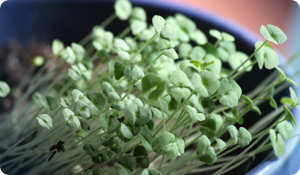
The same seeds that sprouted hair on your childhood chia pet are now being promoted as a weight loss tool that suppresses appetite and provides a host of health benefits on the side. But are they really more than just a novelty item?
Chia seeds, also known as Salvia hispanica, are similar to flax seeds in terms of their nutrient composition and how they can be used in food. Like flax and other edible seeds, chia contain fiber, antioxidants, protein, calcium, and omega-3 fatty acids. You can grind them and add them to waffles, pancakes, breads, and other baked goods.
In spite of their nutritional profile, however, chia seeds have yet to prove themselves useful agents of weight loss. In fact, in a study that included 76 overweight and obese men and women performed at Appalachian State University in North Carolina, chia seeds had no effect whatsoever on weight or body fat. Twice a day participants drank supplements made with 25 grams of chia seed and their measurements were taken after twelve weeks. Compared to those who didn't drink the supplement, there were no differences.
Prior to the Appalachian State study published in a 2009 issue of the Nutrition Research journal, a small study was published in the American Diabetes Association's journal, Diabetes Care, alerting health experts the potential benefits of chia seeds in the diet. Using a specific variety of chia supplements sold under the brand name Salba, these researchers found that the seed may help reduce inflammation, improve blood sugar control, and reduce blood pressure in people with type 2 diabetes. Although these results were compelling, it is worth noting that the Toronto-based company that produces and sells this particular strain of chia, Salba Nutritional Solutions, Inc., provided the seed for this study and the participants were all healthy individuals. However, none of these benefits were confirmed in the Appalachian State study.
Dietary fiber, particularly soluble fiber such as that found in chia seeds, has long been considered a viable weight loss tool. Fiber swells up in your digestive tract and, theoretically, helps you feel full longer so that you may be less tempted to eat extra food between meals. But this benefit only exists in the context of an otherwise healthy diet designed for safe and effective weight loss. No single food, no matter how high in fiber, will help you lose weight unless it is part of a larger plan to shed pounds by following a reduced-calorie diet and getting more exercise.
Chia seeds will certainly add some fiber, essential fatty acids, and other nutrients to your diet, and they are generally considered safe to eat. Just don't have any great expectations about using the seeds to lose weight. If you have food allergies, especially to other types of seeds, or if you take medication to reduce blood pressure or prevent blood clots, speak to your physician before using chia seeds.
Sources:
Nieman DC, Cayea EJ, Austin MD, Henson DA, McAnulty SR and Jin F. "Chia Seed Does Not Promote Weight Loss or Alter Disease Risk Factors in Overweight Adults." Nutrition Research 2009 Jun; 29(6): 414-8. Web 20 August 2010.
http://www.ncbi.nlm.nih.gov/pubmed/19628108
Vuksan V, et. al. "Supplementation of Conventional Therapy with the Novel Grain Salba (Salvia hispanica L.) Improves Major and Emerging Cardiovascular Risk Factors in Type 2 Diabetes." Diabetes Care 2007 Nov; 30(11) 2804-2810.
http://care.diabetesjournals.org/content/30/11/2804.full?maxtoshow=&HITS=10&hits=10&RESULTFORMAT=&author1=Vuksan&andorexactfulltext=and&searchid=1&FIRSTINDEX=0&sortspec=relevance&resourcetype=HWCIT





